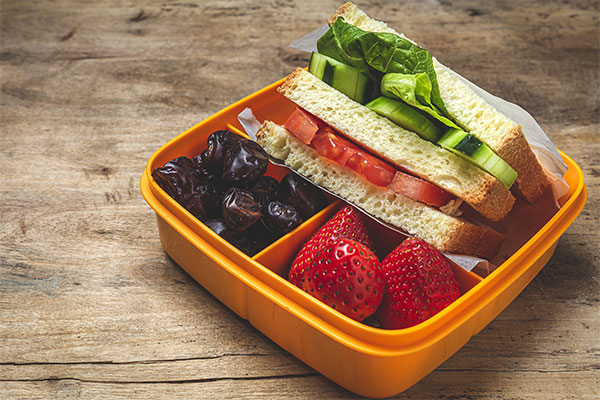Pretty greasy and pretty expensive
The menu at German rest stops and truck stops may fill you up, but it's not always up to the standard of a healthy diet. Eating here often means eating fast - and usually fatty and high in calories. Quality also usually falls by the wayside. With so many rest stops, it's hard to get a clear overview. Which rest stop is really good is usually insider knowledge. What's more, eating at rest stops is relatively expensive in the long run. Some rest stops even struggle with the image of "rest stop food," which is then really indicative of the food on offer. For many drivers, however, the rest stop is still a place to go because you can chat with colleagues or buy small items.
It's up to the man
An alternative to eating at rest stops could be cooking on the vehicle. Not really recommended in winter, but a tasty change in summer. After all, many trucks today are equipped with a microwave, refrigerator or gas stove. Ingredients such as fresh vegetables, fruit, fish or meat are therefore not only easy to store, but can also be prepared quickly and deliciously. Special cookbooks for truckers show how it's done. For example, DEKRA-Media has a trucker's cookbook with 40 delicious recipes that can be prepared quickly on the road. If you search further on the Internet, you will discover many other books that deal with the subject. Cooking directly on the vehicle itself is not "everyone's" thing and not always allowed (with dangerous goods, for example) but is great fun in any case. The quickest way to do it is with some pre-cooked food, which you enrich and process with fresh ingredients on the road. If you're shopping at the supermarket for your "cooking session," check what's in the bag or box by looking at the package directions. Too much sugar or too many carbohydrates should be left to the left.

Cooked at home tastes best ...
Of the many food tips, the best is probably to cook at home and prepare everything for the road. There are said to be riders who don't leave without such a "survival kit". The beauty of it is that if it tastes good at home, it tastes good on the road. The purse is also spared and "fat stuff" remains outside. And if your wife, partner or girlfriend is in charge of the preparation, it happens that some colleagues thank you with a nice idea: If the tour allows it, you simply take the lady of the house with you and invite her to a dinner in the restaurant in the evening. An investment that is certainly worthwhile.
Be careful with soda or cola
Most people drink too little. The daily drinking quantity should be at least 1.5 to 2 liters. Health-conscious truck drivers should avoid soda pop or cola, simply because these drinks contain far too much sugar. And even the light versions are not as light as the advertising suggests. A look at the product information on the bottles provides more clarification. The best thirst quenchers are water, fruit juices diluted with mineral water, and herbal and fruit teas. Coffee or black tea in moderation is also okay.
Healthy nutrition is versatile
Those who eat healthily get more out of life. This is an old saying that truck drivers in particular should bear in mind. Eating and drinking healthily keeps you fit, is fun, increases your performance and, last but not least, ensures safe driving on the road. You are more attentive, in the best of moods and minimize mistakes through less stress. Healthy nutrition is not a one-way street where you only get full, but is as versatile as the job of a truck driver. You are constantly discovering new things, enjoying life and finally knowing what the word "delicious" means. But here, too, it's all about the right mix: What's needed is balance and portions that make you "full" and no more.
Pay attention to what's in it
A healthy diet includes, for example, foods and dishes that are low in fat and sugar. Vitamins, minerals or fiber are also high on the list. Bread, whole grain products, pasta, rice or potatoes are also included. So do plenty of vegetables and fresh fruit. Milk and dairy products are also among the "healthy" products. Another rule is to eat less meat and more fish. And always remember: too much fat makes you fat. This also applies to hidden fats, e.g. in sausages, dairy products, nuts, pastries and confectionery, as well as in fast food and convenience products. Last but not least, sugar and salt should be used sparingly.
A little fitness does not hurt
Truckers are not the only ones who tend not to exercise at all or only minimally. But you should get as much exercise as possible every day. It doesn't have to be the gym, a brisk walk will do. Or forget the elevator every now and then and take the stairs. A few sporting exercises during a rest break also help to do your body good. Information and instructions are available on many fitness sites on the Internet, from health insurance companies or the employers' liability insurance associations. By the way: More exercise is good for you, but you shouldn't overdo it.






